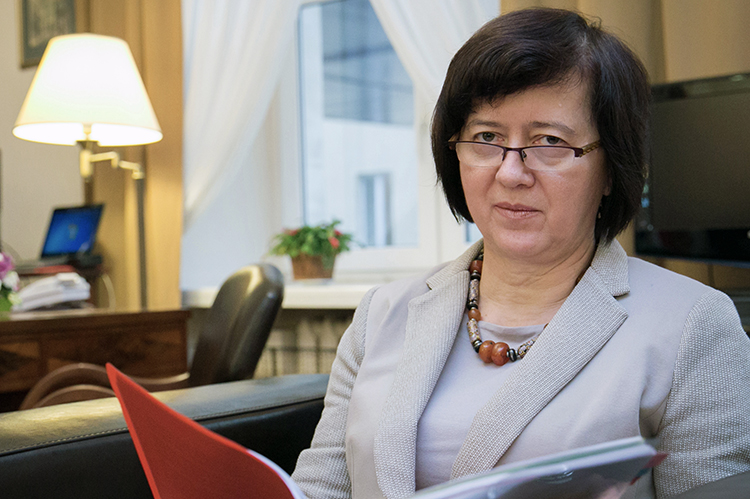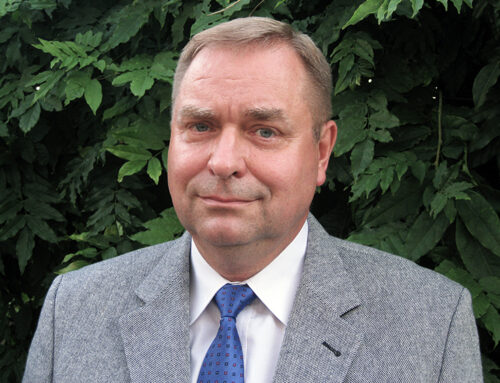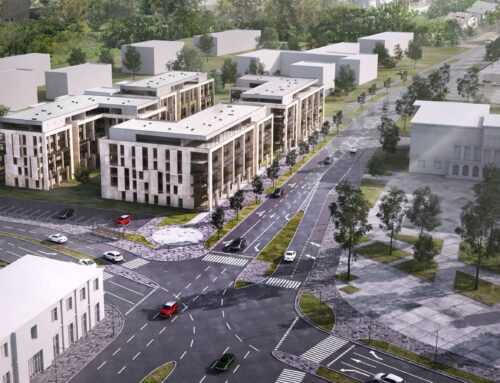
Deputy Minister of Foreign Affairs, Joanna Wronecka, discusses Poland’s economic diplomacy, foreign policy, relations to other countries and international organizations, investment potential and more.
European Times: Could you please elaborate on economic diplomacy – the new focus of Poland’s foreign policy?
Joanna Wronecka: Economic promotion as such remains in Poland in the realm of the Ministry of Development. Nevertheless, there are numerous institutions and governmental agencies on a central and regional level which cover this field within their day-to-day work. We in the Ministry of Foreign Affairs are also keen to provide some added value to it. We take it for granted that our economy needs a greater support if we are to ensure its long-term growth. Hence, to help our businesses secure new opportunities on international markets and to put our diplomatic weight behind their efforts have become the new economic focus of our foreign policy. Through our promotion initiatives launched both in Poland and through our embassies around the world, the Ministry of Foreign Affairs wants to champion Poland as a partner of choice for business people seeking to invest and to do business in our part of Europe. We have injected a new approach into the work of our foreign service to increasingly capitalize on our strong political relationships and help our businesses thrive abroad.
By setting economic objectives as priority concerns for international bilateral relations and by introducing the economic dimension into the functioning of the Ministry of Foreign Affairs, we have managed to transform our day-to-day diplomatic practice. Our diplomats have been encouraged to go out of their way to support Polish entrepreneurs’ commercial and investment projects.
We in the Ministry of Foreign Affairs are convinced that to help our companies secure new opportunities on international markets; an exchange of information with business community proves to be of the utmost importance. We will not be able to provide effective assistance to our companies unless we understand their daily concerns and expectations. Bearing this in mind, we – on a regular basis – consult our diplomatic initiatives and projects with the Council on Foreign Economic Policy to the Minister of Foreign Affairs. A number of business associations as well as science and academic institutions accepted our invitation and cooperate closely with us within the framework of this forum. Such a dialogue helps us to offer an adequate assistance in unblocking obstacles to commercial success, including cultural and language barriers, excessive regulation or weak enforcement of property rights. As an eminent example of this interaction between foreign service (diplomacy) and business community may serve our visits to foreign countries where the official delegation – practically as a rule – is accompanied by a strong business contingent.
European Times: Which projects in the field of economic diplomacy are currently conducted?
Joanna Wronecka: In the last several years, Poland has become the fastest growing economy in the EU and the largest one in Central Europe. Poland left the recent global economic crisis unscathed and – as practically the only European country – steered clear of the recession. Nevertheless, our economy continues to bravely face new challenges posed by globalization, recognizing at the same time the need to increase its stake in international trade and investment. Polish entrepreneurs entered foreign markets with a great confidence winning new contracts and marking there their presence. More and more Polish companies are opening their outlets all over the world offering services ranging from software solutions to real estate management. Our traditional export sectors – food & drinks and furniture – became a Polish trademark on many markets.
The dynamic international expansion of Polish companies means a new challenge of strengthening their competitive advantage on global markets – which in turn means more initiatives undertaken by diplomats. An increasing number of countries have started to pursue economic diplomacy in a decisively more assertive manner – an approach generated by the recent global economic downturn. Some people may think that it is somehow risky to mix business with diplomacy. However, helping our companies strive on foreign markets and working closely with foreign partners is the best possible way for growth, stability and modernization of our economy. Through our promotion initiatives being launched both locally and by economic divisions of our embassies around the world, the Ministry of Foreign Affairs wants Polish entrepreneurs to be champions on foreign markets. Equally, we work with world business champions in Poland.
Visits in foreign countries, numerous workshops, seminars and business meetings were initiated and organized by the Ministry of Foreign Affairs last year. For example, we travelled to Canada, China, India, the USA, Korea, Israel, Qatar, Tanzania, Senegal, Morocco, Denmark, Norway and Finland. On a regular basis we cooperate and maintain contacts with more than 2,500 companies interested in foreign markets.
And, it’s worth mentioning that Poland is going to host the forthcoming COP24 conference in 2018. The conference will be an important point in the negotiating process leading to the implementation of the Paris Agreement by all States. The Ministry of Foreign Affairs supports Polish companies from the green technologies sector. We try to encourage SMEs in particular to look for new markets and partners abroad and to show the ‘green face’ of our country, unfortunately still unknown to so many.
Moreover, the Ministry of Foreign Affairs strongly supports the efforts of the city of Lodz to host the EXPO 2022. Firstly, events of this magnitude have never been taking place in our region of Europe and secondly, Lodz has achieved a lot and has become a leader in revitalizing its urban area in recent years.
European Times: How would you describe Poland’s cooperation with international economic organizations and institutions in Europe and the world?
Joanna Wronecka: The Ministry of Foreign Affairs cooperates very closely with numerous international organizations, including those dealing with trade and economic matters. One of our priorities has been recently to support our companies in their efforts to actively take part in projects and tenders announced by those organizations every year. Our policy in this field focuses on education seminars and workshops for Polish businesses which express their interest in cooperating with international bodies. We want them to acquire skills to enable them to effectively submit their applications in the public tender procedures as well as being involved in projects initiated and financed by those organizations. We join our efforts with other governmental institutions and our diplomatic posts all over the world. In particular, Poland works together with the WTO, International Committee of the Red Cross, the World Bank Group as well as UNCTAD, UNOPS, UNDP, UNPD and UNIDO, an of course – with EU institutions. Over the last two years the Ministry of Foreign Affairs managed to organize about 40 meetings and workshops with experts from those organizations and for more than 1,500 companies and business associations. An exclusively dedicated publication – Public procurement procedures and projects of international organizations. A Guide for a Polish entrepreneur – has been issued by the Ministry of Foreign Affairs in December last year.
Development cooperation is an important part of Poland’s foreign policy. Poland strives to honour its commitments arising from its membership in the EU, the UN and the OECD. Bilateral and multilateral activities of Polish Development Cooperation are intended to contribute to the Sustainable Development Goals. Multilateral cooperation constitutes a major part (approx. 75%) of the Official Development Aid granted every year by Poland to developing countries. The European Union remains the main channel (approx. 90% of the value of the multilateral aid) that transfers the aid, via the contribution to the EU budget and the payments made to the European Development Fund. Multilateral cooperation is also implemented via international organisations, i.e. mainly within the UN system, the World Bank Group, the Organisation for Economic Cooperation and Development, Organisation for Security and Cooperation in Europe and other multilateral development financial institutions. Within the humanitarian aid Poland particularly cooperates with the United Nations Office for the Coordination of Humanitarian Affairs (OCHA), the International Committee of the Red Cross, the UN Refugee Agency and the United Nations Relief and Works Agency for Palestine Refugees in the Near East (UNRWA). The activities of Polish Development Bilateral Cooperation in 2016-2020 are focusing on ten countries: four countries of the Eastern Partnership (Belarus, Georgia, Moldova, and Ukraine) and six countries from Africa (Ethiopia, Kenya, Senegal, and Tanzania), Asia (Myanmar), and Middle East (Palestine Autonomy).
Additionally, Poland in reaction to the recent migration and refugee crisis in the Middle East, has strengthened its support to Syrian refugees, Internally Displaced Persons and their hosting communities in Lebanon, Jordan and Iraqi Kurdistan. Polish aid is provided, among others, via Polish embassies, via payments to international organisations, specialised agencies of the United Nations, development banks and to the international trust funds, such as the EU Emergency Trust Fund for Africa, the EU Regional Trust Fund in Response to the Syrian Crisis (MADAD) and the Facility for Refugees in Turkey. Polish Development Cooperation focuses on supporting the following priorities: good governance, democracy and human rights, human capital, entrepreneurship and private sector, sustainable agriculture and rural development and environment protection. The selection of priorities is based on an in-depth analysis of comparative advantages of Polish transition experience and its potential to advance the reform processes in partner countries. Poland will actively participate in activities aimed at eliminating the causes and effects of crises and seek to strengthen partner countries’ ability to cope with them. Special consideration is given to the humanitarian situation caused by the conflict in Syria and to its broader implications. In response to the crisis, Poland provides humanitarian aid to refugees and hosting populations, especially in neighbouring countries.
In 2016 Poland celebrated 20 years of its membership in the OECD. On this occasion Angel Gurria, the Secretary General of the OECD paid his visit to Poland. Moreover, the Ministry of Foreign Affairs also supported the issuing of two publications, namely: „Re-thinking the OECD’s role in global governance: members, policies, influence” as well as “Policy priorities for making Poland more inclusive and knowledge-based economy”, in a close collaboration with the OECD Secretariat and exclusively devoted for the first time to our country.
Only thinking simultaneously about security, development cooperation and economic growth, can bring anticipated results and support structural economic reforms. New instruments like the European Investment Plan (EIT) appear to be a good approach to achieve expected goals. Poland strongly supports cooperation with other countries, international organizations and the EU to create multicountry, cross-window and cross-cutting projects for developing countries. The most important of fields covered by the EIT is infrastructure. In Poland we do have numerous experienced companies, which are able to carry out various projects together with other European partners.
European Times: How would you describe Poland’s relationship with countries outside of Europe?
Joanna Wronecka: Poland focuses diplomatic activity and provides business assistance in the countries of Asia, Africa and Middle East and Latin America, in particular. We believe these regions and their economic cooperation potential have not been taken advantage of by our business community yet. So, our intention is to intensify trade and investment contacts with them. By the same token, it does not mean that we have forgotten our European partners. However, it is worth to emphasize that since Poland became a fully-fledged member of the EU in 2004 our companies managed to establish successful relations on the European markets.
European Times: How would you describe the atmosphere in Poland towards international investors?
Joanna Wronecka: Poland is an excellent place to invest and develop business. Opinion surveys show that foreign investors confirm their strong confidence in our long-term economic policy and welcome the steady improvement of our investment climate. The number of businesses investing in advanced technology in our country systematically grows – IT, automotive, aviation, cosmetic and pharmaceutical companies of global stature have located their research and development hubs here. We expect the volume of the FDI to rise in the coming years.
Over the last two decades Poland has witnessed the dynamic growth of SMEs. Today, they are looking for opportunities to further expand by acquiring new capital, technologies and developing cooperation with new partners on foreign markets. They are ready to expand and increase their share in international trade and investment. We have a lot to offer especially in sectors such as automobile, household white-goods manufacturing, aviation, business services, energy, retail and pharmaceuticals.
So, Poland is open to business and investment!
European Times: What is your projection for Poland within the next five years?
Joanna Wronecka: The development policy implemented by the state institutions, in the horizon up to 2030, is primarily aimed at increasing the incomes of the inhabitants of Poland, as well as reducing the risk of poverty and social exclusion. It will contribute to a faster convergence of Polish incomes with the EU average. As a result, the quality of life of citizens will improve as well as the level of education and qualifications, which means increase in employment and better jobs, improvement of access to infrastructure and adequate medical care. In the long run, until 2030, we expect the GDP per capita in Poland to reach the level of about 95% of the EU average.
It is important that we promote sensible policies with regard to global value chains also in the light of dynamics in the world economy. Within the next 10 to 20 years, 90% of global economic growth is expected to be generated outside Europe – in China, India, the US, South America and in some parts of Africa, in particular. Already today, more than 30 million jobs in the EU are supported by exports outside the Member States.
As a responsible member of the European Union, the Polish government wishes to promote trade, investment, technology transfer, and policies for inclusive and sustainable development. For instance, Poland strongly endorses the multilateral system embodied in the WTO and a targeted strategy for bilateral and regional trade and investment agreements – in the spirit of building an open, fair and transparent trading system. We count on all the EU Member States to work together to ensure that the benefits of trade and investment are extended to all countries, communities, and individuals. We need to work together to improve market access; we need to negotiate trade agreements with positive developmental impacts; and we need to coordinate measures complementary to trade and investment policy.
When channelled properly, foreign direct investment has a proven track record of boosting regional integration and economic growth, and has emerged as a principal source of financing for development, creating employment, technology transfer, and sharing know-how.




